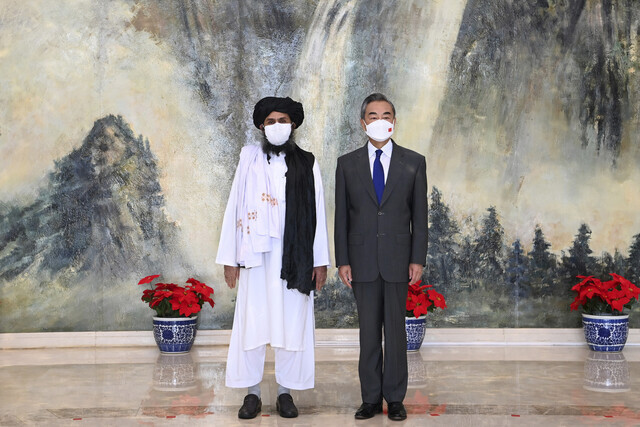hankyoreh
Links to other country sites 다른 나라 사이트 링크
China steps into Middle East role as US retreats

As the US shifts the focus of its foreign affairs and national security policy from the Middle East to the Asia-Pacific region in an effort to target China, China has been proactive about moving in turn to fill the power vacuum.
In particular, Beijing has been stepping up its diplomatic efforts with the Islamic world, including increased communication with Middle Eastern countries amid the chaos following the US withdrawal from Afghanistan.
According to a report Thursday in China’s state-run Xinhua news agency, a 5th China-Arab States Expo opened that day in Yinchuan, capital of the Ningxia Hui Autonomous Region in western China.
A census last year put the population of Ningxia at around 7.2 million, of whom 38% are members of the majority-Muslim Hui ethnoreligious group.
First held in 2013, the expo was designed as an event to promote close linkages between China and Middle Eastern states. The latest event, which focuses on the theme of “strengthening trade and economic cooperation and co-building the Belt and Road Initiative,” lasts for four days and includes around 1,000 businesses participating on and offline, with 239 opening exhibition sites at the venue.
Even with the COVID-19 pandemic underway, China nudged ahead of the European Union last year to become the biggest trading partner of the Gulf Cooperation Council, a union of seven Arab states, including Saudi Arabia.
Chinese Foreign Minister Wang Yi has also been making particular efforts with Middle Eastern and other Islamic states, having made two tours of the region this year alone. After visiting six countries in late March — including Saudi Arabia, Turkey, and Iran — he embarked on another tour in mid-July with visits to Syria, Egypt, and Algeria.
Zhai Jun, special envoy of the Chinese government on the Middle East issue, commented on Wang’s Middle East travels during a 2nd China-Arab Cooperation Forum held via videoconference on Tuesday.
“[The visits] were meant to uphold justice in the international community and resolve conflicts and tensions,” he said.
“Going forward, China intends to intensify its cooperation with the countries of the Middle East, strengthen the foundations of friendship, and achieve collective security together, forming a higher level of partnerships,” he said.
China’s top leadership began taking direct action to pursue diplomatic efforts with the Middle East as soon as the Taliban claimed power in Afghanistan following the US withdrawal. On Wednesday, President Xi Jinping had successive telephone conversations with newly elected Iranian President Ebrahim Raisi and Iraqi President Barham Salih to discuss plans for developing bilateral relations and resolving regional issues.
Wang also had focused discussions on ideas for stability in Afghanistan and eliminating terrorism in telephone conversations with Pakistani Foreign Minister Mahmood Qureshi on Wednesday and Turkish Foreign Minister Mevlut Cavusoglu on Thursday.
Both Xi and Wang stressed the importance of cooperation on COVID-19 prevention, as well as justice and fairness, respect for sovereignty, and non-interference in other countries’ internal affairs. All of them are terms that often come up when Beijing criticizes US foreign policies and its policies toward China in particular.
By Jung In-hwan, Beijing correspondent
Please direct comments or questions to [english@hani.co.kr]

Editorial・opinion
![[Column] Has Korea, too, crossed the Rubicon on China? [Column] Has Korea, too, crossed the Rubicon on China?](https://flexible.img.hani.co.kr/flexible/normal/500/300/imgdb/original/2024/0419/9317135153409185.jpg) [Column] Has Korea, too, crossed the Rubicon on China?
[Column] Has Korea, too, crossed the Rubicon on China?![[Correspondent’s column] In Japan’s alliance with US, echoes of its past alliances with UK [Correspondent’s column] In Japan’s alliance with US, echoes of its past alliances with UK](https://flexible.img.hani.co.kr/flexible/normal/500/300/imgdb/original/2024/0419/2317135166563519.jpg) [Correspondent’s column] In Japan’s alliance with US, echoes of its past alliances with UK
[Correspondent’s column] In Japan’s alliance with US, echoes of its past alliances with UK- [Editorial] Does Yoon think the Korean public is wrong?
- [Editorial] As it bolsters its alliance with US, Japan must be accountable for past
- [Guest essay] Amending the Constitution is Yoon’s key to leaving office in public’s good graces
- [Editorial] 10 years on, lessons of Sewol tragedy must never be forgotten
- [Column] A death blow to Korea’s prosecutor politics
- [Correspondent’s column] The US and the end of Japanese pacifism
- [Guest essay] How Korea turned its trainee doctors into monsters
- [Guest essay] As someone who helped forge Seoul-Moscow ties, their status today troubles me
Most viewed articles
- 1[Column] The clock is ticking for Korea’s first lady
- 2After 2 months of delayed, denied medical care, Koreans worry worst may be yet to come
- 3Samsung barricades office as unionized workers strike for better conditions
- 4[Column] Has Korea, too, crossed the Rubicon on China?
- 5[Correspondent’s column] In Japan’s alliance with US, echoes of its past alliances with UK
- 6Hong Se-hwa, voice for tolerance whose memoir of exile touched a chord, dies at 76
- 7All eyes on Xiaomi after it pulls off EV that Apple couldn’t
- 8US overtakes China as Korea’s top export market, prompting trade sanction jitters
- 9[Editorial] When the choice is kids or career, Korea will never overcome birth rate woes
- 10[Photo] Smile ambassador, you’re on camera